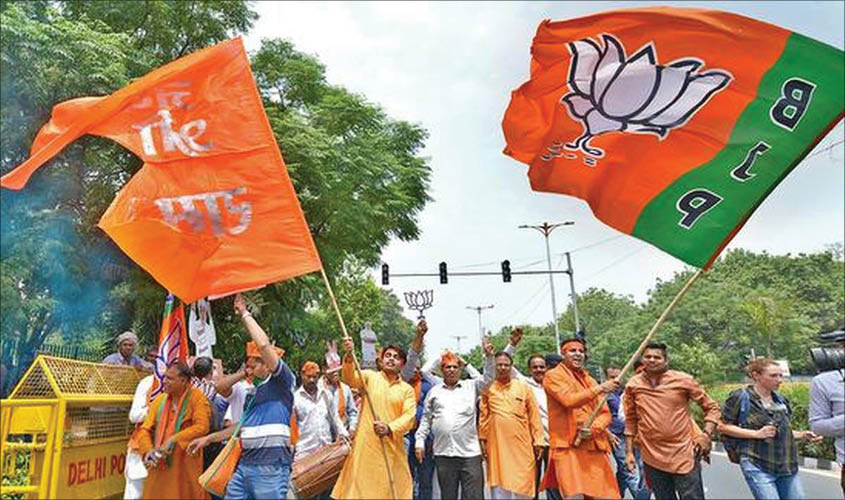New Delhi: The Bharatiya Janata Party’s (BJP) stupendous victory on seven Lok Sabha seats in Delhi with over 56% votes has raised great hopes for the party which is out of power in the state for the last 21 years. With the incumbent Aam Aadmi Party (AAP) sliding down to the third position and the Congress seeking to revive itself, BJP leaders see better poll prospects in the Delhi Assembly polls scheduled in eight months from now.
The Delhi BJP is buoyed by the fact that even the Congress and AAP vote shares put together fell short of the BJP’s vote share. “The election result has certainly ruled out the AAP narrative that their alliance with the Congress could defeat the BJP. The two parties coming together cannot challenge the BJP,” said a beaming Delhi BJP president Manoj Tiwari after defeating his rival Sheila Dikshit of the Congress with a record margin of 3.60 lakh votes.
The Lok Sabha results have come as a huge setback for the Arvind Kejriwal-led AAP whose vote share declined to a meagre 18.1% compared to the 54% votes in the 2015 Assembly polls where it bagged 67 of the 70 Assembly seats. Four AAP candidates ended up losing their security deposits. The Congress, on the other hand, secured 22.5% votes in the Lok Sabha polls and finished second in five of the seven seats in Delhi.
Political observers claimed that ever since the AAP came to power in 2015, their popularity has been on a gradual decline. In the 2013 Assembly elections, when AAP was just about a year old, it got a vote share of 29.5%, which rose to 54% in 2015. However, what indicated its decline was the party’s poor performance in the 2017 municipal polls where it could poll merely 26% votes. The AAP lost to the BJP which won all three municipal corporations.
However, while the AAP suffered a humiliating defeat, the Congress, which was decimated in the 2015 Assembly polls, appeared to be regaining its lost ground. The party won a significant share
Riding on the back of Muslim votes, Congress candidate Sheila Dikshit won over 4 lakh votes in North East Delhi. Similarly, Congress’ Jai Prakash Agarwal bagged close to 3 lakh votes in Chandni Chowk, another Muslim dominated seat, and contained the vote margin below the three lakh mark.
The BJP, which swept all the seven seats in Delhi, set new records in five constituencies where its candidates defeated their opponents with the highest margins ever. Parvesh Verma, the sitting MP from the West Delhi constituency, won a second term with a record-breaking margin of 5.78 lakh votes. Verma broke his own record for the highest victory margin in Delhi.
In 2014, he had trounced his closest rival, Jarnail Singh of the AAP, by a margin of 2.68 lakh votes.
Hans Raj Hans, the BJP candidate from the Northwest Delhi (reserved) seat, clobbered his closest rival, Gugan Singh of the AAP, with an emphatic margin of 5.53 lakh votes, a record in the constituency. Cricketer-turned-politician and BJP candidate from East Delhi, Gautam Gambhir, trounced Arvinder Singh Lovely of the Congress by a record margin of 3.91 lakh votes. BJP’s South Delhi candidate, Ramesh Bidhuri, defeated first-timer Raghav Chadha of the AAP by 3.67 lakh votes.
BJP’s Delhi unit chief Manoj Tiwari clinched the Northeast Delhi seat, defeating three-time Chief Minister Sheila Dikshit by a record margin of 3.66 lakh votes. Only Union minister Harsh Vardhan and BJP leader Meenakashi Lekhi won their respective seats by a margin less than the 2014 record. While Lekhi won the second term defeating Ajay Maken of Congress by 2.56 lakh votes, Union minister Harsh Vardhan had the lowest winning margin in the city at just 2.28 lakh votes in Chandni Chowk.

